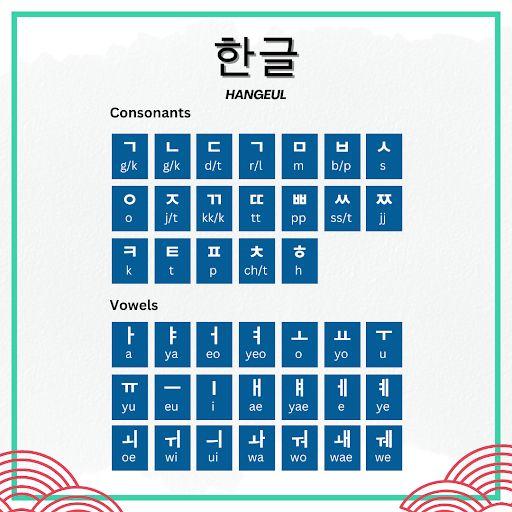10 Common Challenges When Learning Korean Alphabets
And How To Overcome Them
ONLYOU Korean Language School
Learning a new language can be a rewarding but challenging experience, especially when it comes to mastering the alphabet. Understanding the Korean alphabet, known as Hangul, is a crucial first step for those who want to learn the Korean language. We will explore ten common challenges faced by learners and provide practical tips on how to overcome them.
Familiarity with a New Script
One of the initial hurdles when learning Korean alphabets is the unfamiliarity with a new script.
Unlike the Roman alphabet used in English, Hangul is a unique script with fourteen basic consonants and ten basic vowels. Overcoming this challenge requires consistent exposure and practice. Utilise online resources, mobile apps, and language learning platforms to reinforce your knowledge of Hangul characters regularly.
Pronunciation Difficulties
Pronouncing the Korean alphabet can be challenging for English speakers due to differences in phonetic sounds. Hiring a Korean language tutor can be immensely beneficial in correcting pronunciation errors. Regular practice with a native speaker will help you develop a more accurate and authentic Korean accent, boosting your overall language proficiency.

Memorising Characters
Memorising the characters of the Korean alphabet can be overwhelming, particularly for beginners. To overcome this challenge, break down the process into manageable chunks. Focus on learning a few charactersdaily,usemnemonicdevices,andcreate flashcards to reinforce your memory. Consistent practiceiskeytomasteringthecharacters.
Understanding Double Consonants and Vowels
It's essential to grasp the distinctions in sound and length between single and double characters. Engage in listening exercises, watch Korean videos with subtitles, and practice speaking to enhance yourabilitytodifferentiatebetweentheseelements.
ALSO READ: Konglish: What is it and How it HelpsYou to Start Speaking Korean
Word Construction
Constructing words using Korean alphabets can be intricate for beginners. Practice writing and forming sentences regularly, and consider using language learning apps that offer interactive exercises focused on word construction. Consistency in practice will build your confidence in constructing Korean words effortlessly.
Reading Speed and Fluency
Achieving reading speed and fluency in Korean can be a gradual process. Begin by reading simple texts and gradually advance to more complex materials. Regular reading sessions will improve your speed and comprehension. Additionally, practising with a Korean language tutor who can provide real-time feedback on your reading skills will accelerate your progress.
Cultural Context and Etymology
Understanding the cultural context and etymology of Korean words can be challenging for language learners. Immerse yourself in Korean culture, watch Korean dramas or movies, and read Korean literature to gain insights into the language's cultural nuances. This holistic approach will deepen your understanding of the languageandenhanceyouroveralllearningexperience.
Lack of Motivation
Maintaining motivation throughout the language-learning journey is crucial. Set realistic goals, celebrate small victories, and stay connected with a communityoflearners.Joinonlineforumsandlanguage exchange programs, or find a language partner to share your progress and challenges. Having a support system can reignite your motivation during moments of frustration.

Limited Exposure to Native Speakers
Limited exposure to native Korean speakers can hinder language development. Utilise language exchange programs or online platforms to connect with native speakers for conversation practice. Engaging in regular conversations with native speakers will not only improve your speaking skills but also provide valuable cultural insights.
Overcoming Fear of Making Mistakes
The fear of making mistakes can be a significant obstacle in the language learning process. Embrace mistakes as partofthelearningjourneyandviewthemasopportunitiesforimprovement.AKoreanlanguagetutorcancreate a supportive environment where you feel comfortable making errors and learning from them. This positive mindset shiftiscrucialforlong-termlanguageproficiency.
Conclusion
Learning the Korean alphabet is a foundational step in mastering the Korean language. While challenges may arise, consistent practice, exposure to native speakers, and a positive mindset can help learners overcome these obstacles. By addressing these common challenges head-on and incorporating effective learning strategies, aspiringKoreanlanguageenthusiastscanunlockthedoortoarichlinguisticandculturalexperience.
ContactONLYOUKoreanLanguageSchoolifyouarelookingforaKoreanlanguagetutor!
